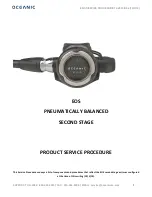
USER MANUAL
pH 58
Pocket-size
pH/ORP/°C/°F Meter
www.milwaukeeinst.com
Automatic Temperature
Measuring unit
Compansation Indicator
on main LCD
Instability Indicator
Main LCD
Calibration Indicator
Temperature
Low Battery Indicator
reading
Secondary LCD
OPERATIONAL GUIDE
• Remove the electrode cap and immerse the
meter in
MA9015
storage solution for 2 hours
to activate the electrode.
• Turn the meter on by pressing the ON/OFF
button. All the used segments on the LCD will
be visible for 1 second or as long as the button
is pressed.
• Immerse the electrode in the solution to be
tested. Stir gently and wait for the reading to
stabilize, i.e. the instability indicator
(hourglass) on the LCD turns off.
• Select the pH or ORP (mV) mode by
pressing the SET/HOLD button.
• The displayed pH value is automatically
compensated for temperature. The ORP (mV)
value will be displayed on the main LCD, while
the temperature will always be displayed on
the secondary LCD.
•
To freeze the display
, while in measurement
mode, press and hold the SET/HOLD button.
The “HOLD” message appears on the
secondary display and the reading will be
frozen on the LCD. Press any button to return
to the normal measurement mode.
•
To turn the meter off
, press the ON/OFF
button. The “OFF” message will appear on
the secondary display. Release the button.
Note:
• Before taking any measurement, make sure
the meter is calibrated (the CAL tag is on).
• After use always turn the meter OFF, rinse
the electrode with water to minimize
contamination and store it with a few drops of
storage (
MA9015
) or pH7 (
M10007
) solution in
the protective cap.
NEVER USE DISTILLED OR DEIONIZED
WATER FOR STORAGE PURPOSE.
CALIBRATION PROCEDURE
The ORP (mV) range is factory calibrated
.
Contact the nearest Service Center for
recalibration, if necessary.
For better accuracy, frequent calibration of the
tester is recommended. Calibration is also
necessary after electrode replacement, after
testing aggressive chemicals and where
extreme accuracy is required.
• Turn the meter on and select the pH mode
with the SET/HOLD button.
• Press and hold the ON/OFF/CAL button until
the “OFF” message on the secondary LCD is
substituted by “CAL”. Release the button.
• The instrument enters the calibration mode
by displaying “pH 7.01 USE” (or “pH 6.86
USE” if the NIST buffer set was selected).
• For a
single-point calibration
, immerse the
electrode in any buffer, i.e. pH 4.01, 7.01 (or
6.86), 10.01 (or 9.18).
• The meter activates the automatic buffer
recognition. If no valid buffer is detected, the
meter keeps the USE indication active for 12
seconds, and then replaces it with WRNG,
indicating that the sample being measured is
not a valid buffer. Otherwise, if a valid buffer is
detected, then its value is shown on the
primary display, and REC appears on the
secondary LCD.
• If the pH 7.01 (or pH 6.86) was used, press
the SET button to exit the Calibration mode
and the “OK 1” message will appear on the
display. The first calibration point is stored and
the meter returns to normal measurement
mode.
For better accuracy, it is always
recommended
to perform a 2-point
calibration.
• For a
two-point calibration
, immerse the
electrode in pH 7.01 (or pH 6.86) buffer
solution.
• After the first point has been accepted, the
meter will then ask for the second buffer and
the message “pH 4.01 USE” will appear.
• Rinse the electrode and immerse it in the
second solution (pH 4.01, 10.01 or 9.18).
• If a valid buffer value is detected, the REC
message is displayed and the meter
completes the calibration procedure. The LCD
shows the accepted value with the “OK 2”
message and the instrument returns to the
normal measurement mode. Otherwise, if no
valid buffer is detected, the meter displays the
WRNG message.




















